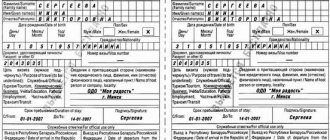Rights of a non-owner registered in an apartment
Many residents are interested in the question: does registration affect ownership? And what does registration at the place of residence actually give? The relevance of the issue is due to the fact that owners are faced with requests to register on their living space.
Attention! After a person registers, it does not matter whether the housing is privatized or not, he receives the following rights:
- reside in the territory where he is registered,
- use common property, as well as property located in the apartment,
- draw up the necessary documents in organizations at the place of residence, such as TIN, SNILS, medical policy,
- arrange benefits and subsidies,
- place minor children in kindergartens and schools,
- receive medical care,
- officially register for work,
- register close relatives and minor children at the place of registration,
- give consent to the registration of other persons.
The list of rights is not small, but is of a notification nature. Registration cannot give ownership of residential premises. A citizen will be able to register ownership of housing only if he purchased the property, received it by inheritance, or as a gift.
Free consultation with a lawyer on housing issues around the clock.
Types of registration
Registration in an apartment can be indefinite or temporary. In the first case, we are talking about long-term (lifelong) use of living space. Permanent registration is recorded in the passport of a citizen of the Russian Federation.
Temporary registration can be issued at the place of residence or at the point of stay. For example, if a person stays with his spouse for a long time, but is registered at a different address, the law requires registration at the new place of residence. It is not indicated in the passport, but requires the issuance of a certificate of temporary registration.
If a person lives at a different address in connection with the performance of official duties for no more than 90 days (for example, he is sent to another city), then this requires registration at the place of stay and the issuance of an appropriate document. In all three cases, registration is carried out by the Directorate for Migration Issues (Ministry of Internal Affairs).
Living in an apartment without registration may result in administrative sanctions for both tenants and the owner.
By law, every person changing their location is required to register at their new place of residence within 7 days from the date of arrival. If temporary residence is intended for no more than three months, then registration must be completed within 90 days. If this is not done, the citizen will face a fine of up to 3,000 rubles.
This is interesting: How to register at a new place of residence when moving and changing address
Rights of a person registered in a municipal apartment
If a citizen lives in municipal housing, he fulfills the conditions of the social tenancy agreement. It is this agreement that gives him the opportunity to use the residential premises. But even in municipal housing, a person registered there does not receive owner rights.
He has the right only to live in the apartment and use all provided utilities. Relatives of a tenant who has entered into a social tenancy agreement have the same rights as him.
The law indicates that only those registered in the same living space as the tenant will be considered family members. These are parents, spouses and relatives. All registered persons must be indicated in the social tenancy agreement.
If spouses divorce, they still have the right to reside in the territory where they are registered.
Rights that are registered in non-privatized housing
All rights of citizens registered in an apartment are enshrined at the legislative level in the Housing Code of the Russian Federation. The main responsibility of the tenant is to monitor the condition of the apartment in which he lives.
With the consent of other residents, he has the right to register third parties. But at the same time, the standard area per person is taken into account. The tenant himself and registered members of his family have the same rights to living space.
Please note! In accordance with the law, minor children must be registered at the place of residence of their parents. If only one parent is registered in the apartment, the written consent of the second will be required.
If you need to register a child in a non-privatized apartment, then the consent of other residents is not required.
Nuances
Living in a private house and being registered there, a citizen can use the house and not be its owner, who registers or registers someone in accordance with his preferences and the letter of the law.
One aspect is very important when considering registration issues. If a citizen registered in the house has children, the owner has the opportunity to register them on the territory with all the ensuing consequences. Parents of heirs can draw up any paperwork using the children's registration address. If the children do not and will not have any other housing in the future, they cannot be discharged. Residents cannot interfere with the owner's sale of the property.
The rights of registered residents must be written down in a future document. In the event that the person selling the house does not want to grant rights to other persons, an additional document must be drawn up, which must be notarized. There is no concept of “registration without residence” in the legislation. The possibility of obtaining rights to dispose of housing arises in the following cases:
- real estate purchases;
- receiving an inheritance;
- annuity agreement (lifetime);
- deed of gift.
In the event that the apartment was received as a gift, the general rules apply to the residents registered in the apartment. The Housing Code of the Russian Federation describes the rights of the owner and his family members (residing by registration) as equal. Parents, children, and spouses are recognized as family members. The tenant has the right to start redevelopment or rent out part of the property. This is possible only after obtaining the written consent of the owner .
A person living in an apartment and not being a family member has the right only to accommodation and nothing more. Among other things, residents registered on the territory who are not the owners are required to participate in the payment of utilities and the costs of maintaining the housing in proper condition.
If you don't live on site
If a citizen is registered in an apartment, but does not live there, no one can deprive him of his rights. He possesses them to the same extent as the residents. The concept of registration without the right of residence does not exist in Russian legislation.
Despite the large list of documents, registering in an apartment is easy. The greatest difficulty is deregistration, this is especially difficult for the owners of the premises.
Features of registration
The legislation defines two types of registration. This is a registration with the owner of the apartment, as well as registration with the right to living space. Whatever option is chosen, the essence of registration will not change.
Its goal is that a person has the right to be in a particular region legally, live in a residential area and use public services. Registration will not affect the right of inheritance, as well as the right to allocate a share. Registration only affects the right of residence.
In other cases, it will not have any significance in matters of property disposal. The owner of the apartment has the right to provide accommodation to other citizens, but this is not lifelong residence, but temporary.
The essence of registration is that a citizen can live in an apartment, but it gives him the right to use only a few benefits.
Notice! He has the right to use certain services:
- such a citizen does not need to pay for services from the municipality,
- he has the right to put the child on the waiting list for kindergarten and school,
- has the right to receive various social benefits,
- can officially find a job,
- receive medical care according to your area of residence free of charge,
- has the right to receive documents at the place of registration.
To summarize the above, we can say that registration makes it easier to live in a region or locality. A citizen does not have the right to reside without registration for more than 3 months. Violation of this requirement will result in prosecution.
It is important to note that only the citizen who is the owner of the property has the right to register interested parties. But they are registered only with the consent of other owners who have the right to this housing.
Registered citizens will have only a few options and will not be able to independently manage their housing. Any owner has the right to prohibit the possibility of registration of third parties in his apartment.
Apartment owners are interested in the question of whether the registered person has the right to the apartment itself, or whether he can only live in it. Persons who are registered in the apartment only live in it, but they do not have the right to make any transactions with property. Only homeowners have full control over the property.
This rule is approved at the legislative level. Only an agreement between the owner and the registered person can change the procedure for this agreement.
But at the same time, the registered persons can later become heirs under the will. The most common option for registration between relatives is the option of granting the right to lifelong residence.
Watch the video. Rights to the apartment of persons who are not owners:
What does registration in an apartment give?
All capabilities of officially registered citizens who are not co-owners are limited to administrative functions. What exactly does permanent registration in an apartment give to a non-owner? He receives benefits when finding a job, registering a child for school or kindergarten, receiving a health insurance policy, social payments and benefits. Registered citizens can indicate their registered address in official documents.
To the owner
The full owner of the apartment has unlimited powers to take any actions with the housing. He can:
- sell, leave it as an inheritance or as a gift;
- register citizens, regardless of their relationship;
- rent out;
- use as collateral when applying for a loan.
The owner can forcibly expel a registered person from a house, room, or apartment without consent (with the exception of minor citizens who do not have their own living space).
If an apartment or house has several co-owners, then all actions with real estate (sale, rental, registration of other persons) must be carried out with the written consent of each of them.
To the person registered in the apartment who is not the owner
Usually the question of what rights a registered person—not the owner—has has arises when solving housing and material problems. For example, when dividing jointly acquired property during a divorce or alienation of real estate from the previous owner.
According to the law, a person who is officially registered in the housing space, but is not the owner (i.e., did not participate financially in the purchase of real estate and the privatization process), can only give consent to the registration of other people, as well as register their young children. This is where his powers end. Therefore, the answer to the question - does registration give ownership of a privatized property is an unequivocal no.
Registration is not the basis for the emergence of property rights to occupied housing.
Citizens registered in non-privatized housing
What rights does registration in an apartment that is at the disposal of the state give? All officially registered residents have the same powers during its privatization. Upon transition to private ownership, they become full co-owners. Any of the tenants may, if they wish, renounce their due share in the property in exchange for the right to permanent residence.
This is interesting: How to properly register with the MFC
About registration in private houses
Registration in a private house is no different from registration in an apartment. If a person is registered in a private house, he can use the property, but he does not receive the rights of the owner.
At the same time, the owner has the right to write out those with whom he does not want to live in the same territory. One caveat concerns children. If a citizen who is registered in the house has children, the owner is obliged to register them. Children cannot be discharged if there is no other living space. Parents have the right to complete all documents using this address.
When registering third parties, it is recommended to resolve the issue with children in advance. If the owner decides to sell his property, the tenant has no right to prevent him from doing so. Once the transaction agreement is signed, the right of use will change.
If the owner does not want one of the relatives to receive additional rights, it is necessary to draw up a document certified by a notary. But no owner can deprive a child of his right to live with his parents.
Registration period after discharge.
Rights of a tenant who has registered a residence permit
Statistics show that in most cases, family members and immediate relatives can apply for registration in the owner’s home.
Video
The list includes:
- husband or wife;
- children, regardless of whether they are natural or adopted;
- parents.
The owner can consider other relatives as members of his family, as well as dependents and persons with whom there are no family ties, and register a residence permit in the property. The corresponding decision must be documented. To do this, a permit is issued for temporary or permanent registration in housing.
Please note: As a general rule, persons registered at the place of residence have exactly the same rights to use an apartment or house as the owner. However, detailing the capabilities is acceptable. To do this, you will need to prepare a separate document, which is provided during registration. Regardless of the list of rights that are granted to housing, a person is obliged to take care of the property, comply with established standards, and maintain the integrity of the premises.
In practice, family relationships can be terminated. Thus, marriages between spouses are often dissolved. In this situation, the spouse who registered in the apartment or house loses the right to use the premises. In this case, the owner can independently expel the person from the property. In this case, the provisions of contracts or other documents are taken into account. If the marriage is dissolved in court, a temporary right to use the housing may be established. If the person living in the premises is not related to the owner of the apartment, use of the housing is possible only under the conditions established by the owner.
Video
Opportunity to become a property owner
Can a registered citizen become an owner? There is one exception to this question. It concerns public housing.
A person registered in municipal housing can become not only a tenant, but also its owner. But one condition must be met. This citizen has never participated in privatization.
In this case, when a municipal apartment is privatized, he will become its owner legally. The same applies to minor children of a citizen if they were previously registered in this apartment.
This is precisely the pitfall that you should think about when you are asked to register a distant relative. If the tenant lives in a municipal apartment and a distant relative has minor children, you should consider this request.
What documents are needed for registration
Both individuals and the municipality have the right to register a citizen in an apartment. If the apartment belongs to several owners, then they must take part together in deciding whether to grant registration to someone.
To register a citizen who is not the owner of a property, the passport office will need to provide the consent of all owners of this property.
applications for registration at the place of residence free of charge in word format
Attention! Permission for registration does not need to be provided in the following cases:
- if a newborn or minor child is registered in the apartment in which his parents are registered,
- close relatives, adult children, spouses or parents, but a written application from the owner of the property is required.
- when registering a shareholder of a real estate property.
To obtain registration, the following documents are provided:
- application from the apartment owner in the approved form,
- participants' passports,
- documents that confirm ownership of housing,
- written consent of all home owners; if we are talking about a municipal apartment, then the approval of not only the owner, but also all persons registered in it is necessary,
- If we are talking about registration in a private house, you must provide a house register.
Attention! Our qualified lawyers will assist you free of charge and around the clock on any issues. Find out more here.
Depending on the situation, additional papers are required:
- marriage certificate for registration of a spouse,
- the child’s birth certificate and a certificate stating that he is not registered with the second parent, if the parents are registered at different addresses,
- if the registered citizen has been discharged from his previous place of residence, a certificate of discharge is provided,
- Sometimes, in order to obtain a residence permit, they require a certificate of no rent arrears,
- When registering, men under 27 years of age are required to present military identification.
Children over 14 years of age must attend registration in person. Check the list of required documents at the passport office. In addition, they submit an application not only to the passport office, but also to the MFC. It is also allowed to send an application through the State Services portal.
Subtleties of registration
Registration of citizens in a certain premises does not limit their freedom to choose a place to live. A person who does not know the intricacies of the law, as a rule, is afraid to register someone on his territory, because he does not want the tenant to have the opportunity to become an owner. All owners (individuals and legal entities) can be registered.
If the property has several owners, the decision on registration is made collectively. In some cases, for the entry of people who are not the owners of the premises, the Migration and Relocation Service may require written approval, which must be signed by all owners of the premises, except in the following cases:
- registration of a newborn or a person under the age of majority;
- registration of relatives: children, spouses, parents (subject to a written application from the owner);
- registration of shareholder.
When contacting the authorities for registration, you must collect the following documents:
- owner statement;
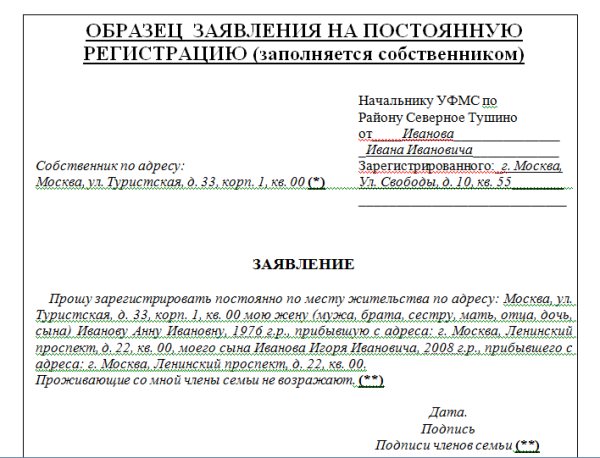
- identity cards of all participants in the process;
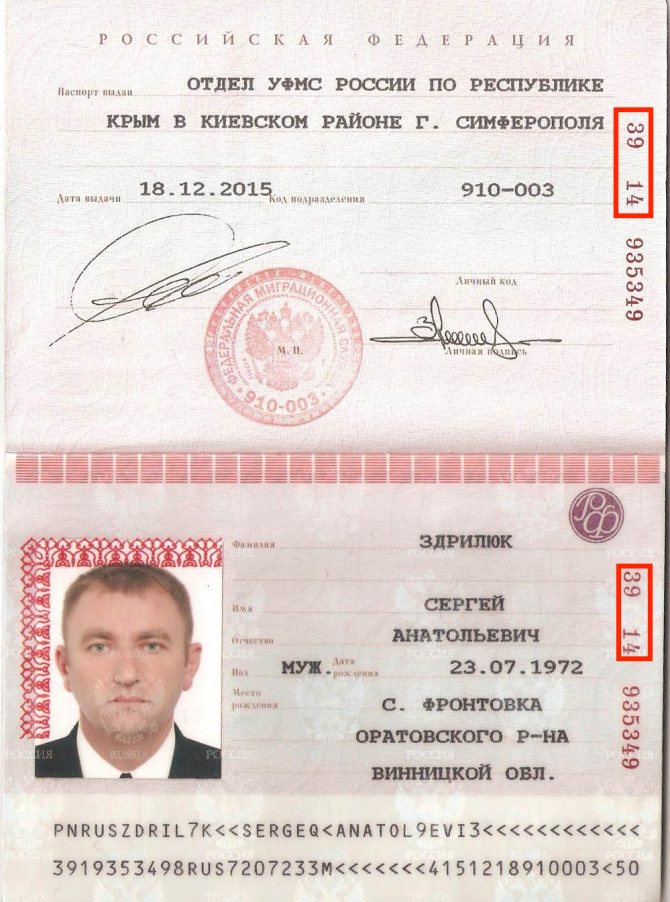
- documents for an apartment or social tenancy agreement;
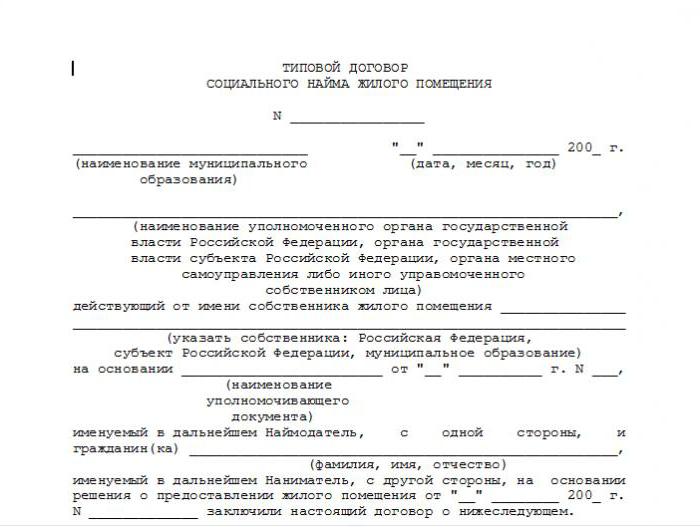
- consent of the tenant-owners in writing;
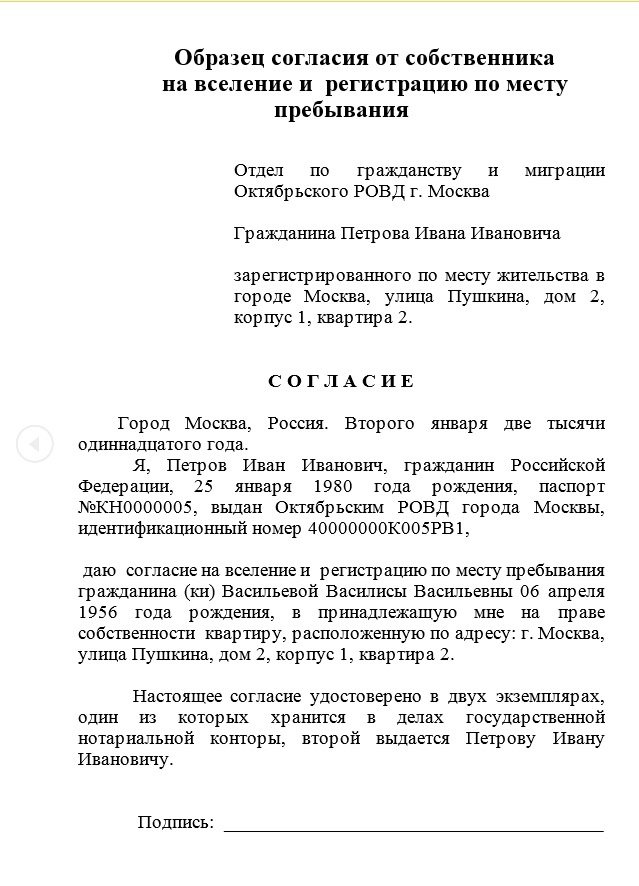
- for municipal housing - consent of the authority and those registered;
- for a private house - recreation center.
- extract from the old place of residence (if any);
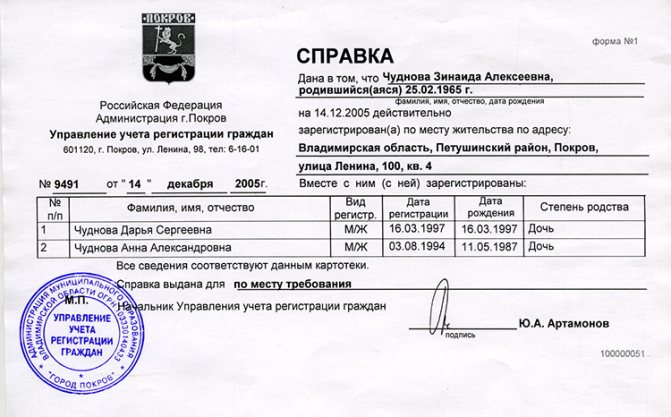
- marriage document when registering a spouse;
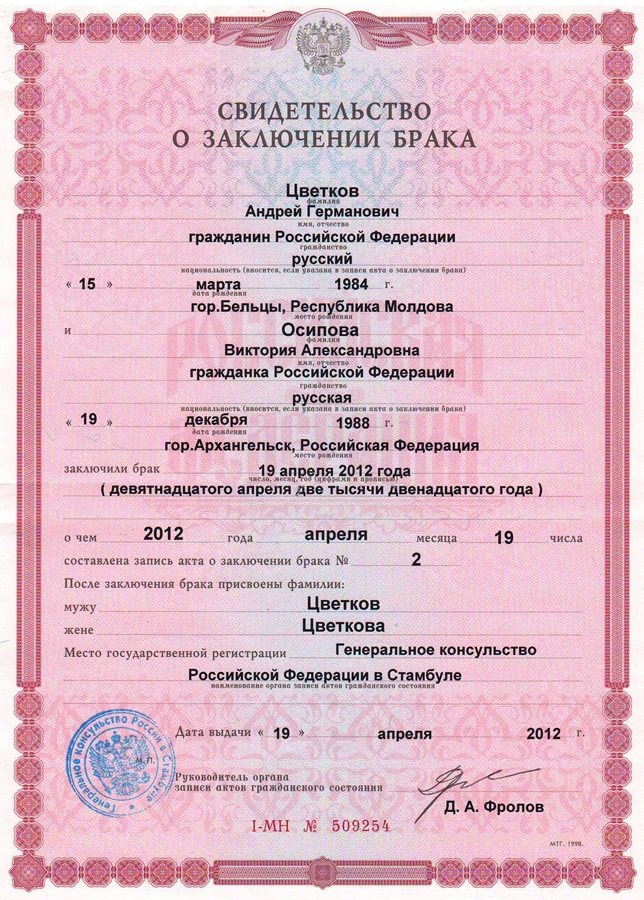
- a document confirming the birth of a child not registered with the other parent, and a supporting certificate;
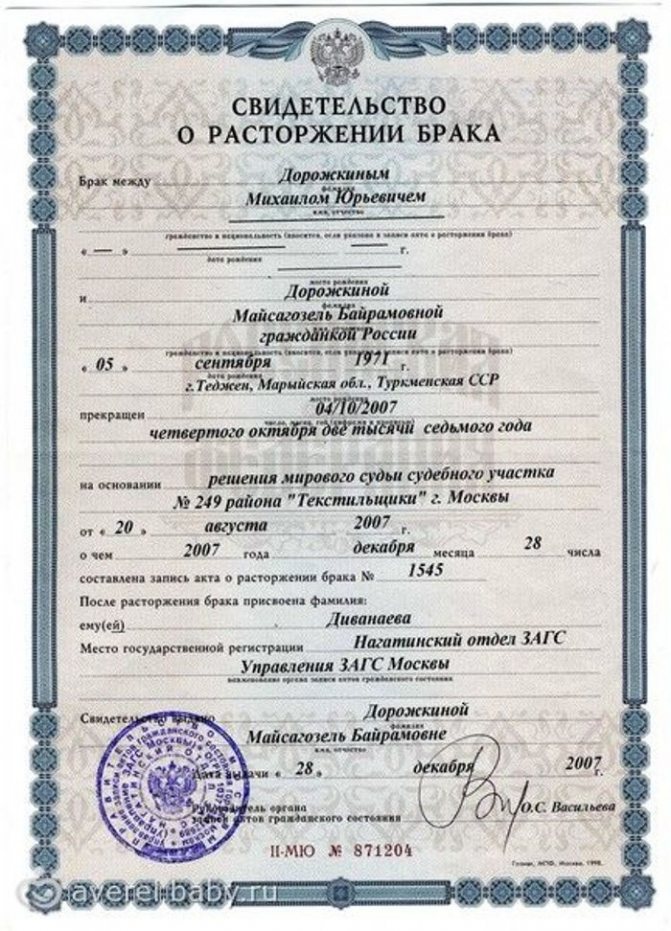
- receipts for no debts;
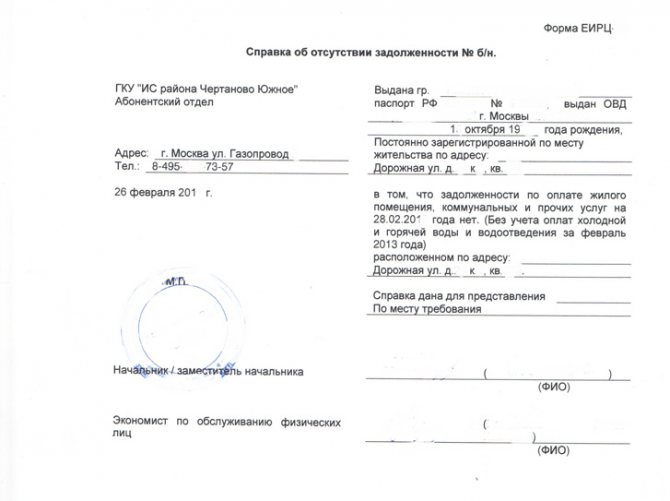
- document of a person liable for military service (up to 27 years of age).
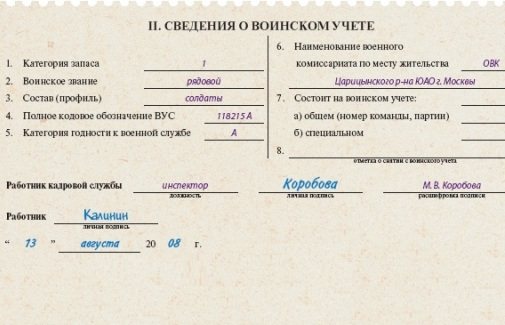
The package of papers is submitted to the Federal Migration Service, Housing and Communal Services, or is issued electronically on the government services website. The owner of a residential premises living in it under a social tenancy agreement can:
- in agreement with the owner (municipality) and the approval of other persons living on the territory, register other persons;
- coordinate ownership decisions with other residents;
- rent out an apartment to temporary residents;
- register young children.
Any of those living in rented housing can register its ownership and become its co-owner. Children under 18 years of age can also participate in this process, subsequently privatizing it again.
Do I need to pay for utilities?
Remember! Article 30 of the Housing Code of the Russian Federation determines that the owner of the property bears the costs of its maintenance. If the premises belong to a common area in an apartment building, then the owners must jointly compensate for the costs of operating the facility.
It does not matter who lives or is registered in the living space. Maintenance costs, including payments for housing and communal services, are covered by the owner.
Thus, depending on the status of the premises, the rights of the citizen registered in the apartment will be different. The owner does not have the right to live in a privatized apartment, but he will not be able to dispose of the property. The only thing he has the right to do without notifying the owner is to register minor children.
Citizens registered in the municipal residential area have the right to jointly resolve issues regarding registration of other citizens and rental. But some actions are carried out only with the consent of the municipality.
Is it possible to register in a garden house?
Does the homeowner have the right to evict someone from the apartment without consent?
The owner can remove a citizen from the living space without his consent. But such a situation can only be resolved through the courts. In this case, the circumstances of the case will be taken into account in the trial. First of all, these circumstances relate to the relationships between residents.
Notice! The following criteria will be taken into account when deciding the case:
- marital status between the owner and the occupant,
- age group living in the apartment,
- the propensity of a resident citizen to develop bad habits.
It is important to note that valid reasons must be documented. For example, if a tenant leads an immoral lifestyle, this must be confirmed by the testimony of neighbors and the district police officer. The law provides for situations where the owner has the right to evict a tenant without prior consent.
Watch the video. How to evict a tenant from an apartment?
Grounds for expulsion from the apartment
To discharge a tenant without his consent, the owner will have to go to court. When considering the case, the court will take into account all the nuances. Personal relationships between residents, degree of relationship, etc. are considered. The fundamental criteria are:
- Family status;
- age of residents;
- personal qualities (bad habits).
The owner who goes to court must provide evidence regarding the problem that has arisen. Judicial practice knows many examples of citizens being evicted from their living space without their consent. Each case requires individual consideration.
The rights of a person living in an apartment based on registration are stipulated by law. Violation of these rights is unlawful and corresponds to a violation of the rights of the owner. In this matter, no one has an advantage; you should be interested in legal acts on this matter and know your capabilities and rights.





